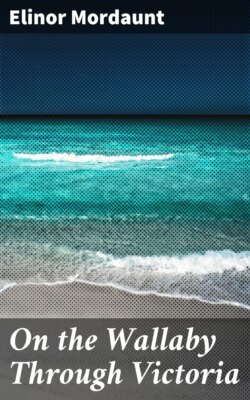Читать книгу On the Wallaby Through Victoria - Elinor Mordaunt - Страница 3
На сайте Литреса книга снята с продажи.
INTRODUCTION
ОглавлениеTable of Contents
This is not supposed to be a national or political history of Victoria. When I was asked to write something about the country which has extended its hospitality to me, and given me bread and cheese—sometimes no cheese, it is true, and more often than not no butter, but still always bread, and an ever-increasing appetite—I must confess I felt frankly scared. There is a very good, if somewhat vulgar, expression in use out here, which speaks of anyone who attempts what is beyond them as “biting off more than they can chew.” And the thought frightened me. There seemed to be so many people who had lived all their life in the country, and were therefore much more capable of writing about it than I could ever possibly hope to be.
However, I found that other “fools rushed in,” who had been here for even a shorter period than myself; who had never participated in any way in the true life of the country, or depended on it for their own life, which after all teaches one more than anything else ever can about a place. I may not be an “angel,” I thought, still I know it, which is one point in my favour; and, after all, eight years can scarcely be described as a “rush.” Besides, every proverb and popular saying seems to be balanced by another which is completely contradictory—and while it may be true that “fools rush in where angels fear to tread,” it is also true “that lookers-on see most of the game,” and perhaps score somewhat in the freshness of their impressions and in their facilities for comparison.
As it is I can only write about Victoria as I know it. There are many mistakes that I may have made through my inability to see all sides of a question; but they are at least honest mistakes, and not the deliberate misstatement of facts, from which Australia has so often suffered.
Of course, there are numberless phases of life out here which I have never even touched: my nose has been too close to the grindstone, while life has resolved itself for the most part into a mere struggle for existence. Still, that very struggle has brought me into touch with real people, and with the many grades of society which are to be found here as elsewhere, in spite of all the theories of democracy.
I have edited a woman’s fashion paper, of sorts, and was dismissed because—I confess it—the compositors were quite incapable of reading my writing. I have written short stories and articles; I have decorated houses, painted friezes, made blouses for tea-room girls, designed embroideries for the elect of Toorak, even for the sacred denizens of Government House. I have housekept, washed, ironed, cooked. Once I made a garden, drew out the estimates, engaged the men, bought soil and manure, shrubs and plants, laid out a croquet-lawn, delved, sowed and planted shrubs which, now threatening to become trees, perhaps represent the best result of all these years of continuous labour. Palpable results, I mean, for the other results, the enlarged outlook, the humanity, the pathos, and the friendship, with which the memory of them is crammed, form, after all, an asset which is by no means to be despised.
Still, when I recollect that I have been here for more than eight years; and that even now less than ten times that number of years has actually passed since the natives ceded to Batman, for knives, and beads, and looking-glasses, the present site of Melbourne, and much of the surrounding country, I am filled with the most abject shame at my own achievements and unlimited admiration for these people, so often dismissed by the ignorant at home and abroad as only “colonials,” who have built up such a town as Melbourne and such a country as Victoria is to-day.
